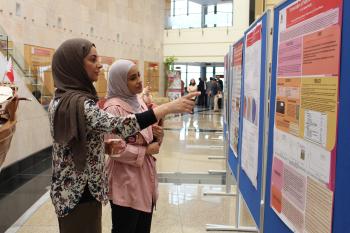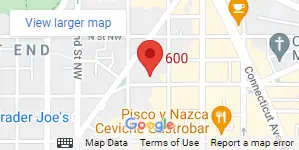
U.S. Host Institutions
Sponsored by the U.S. Department of State, the Fulbright Visiting Scholar Program for Iraq (IVSP) brings junior faculty in various discipline-based cohorts to the United States for intensive 10-week programs for faculty development, mentoring, and cultural exchange activities.
The intent of these programs is to equip junior faculty from Iraq with the tools needed to build higher education capacity within their home institutions and advance education for future generations. The programs also provide the foundation for junior faculty and their U.S. hosts to develop sustainable institutional relationships and identify areas of cooperation to foster long-term collaboration and institutional linkages.
Program Objectives:
- Build higher education capacity in the home country of junior faculty through faculty development and mentoring.
- Foster long-term collaboration and institutional linkages between junior faculty and U.S. academics.
- Promote mutual understanding between the home country of junior faculty and Americans by facilitating engagement with the broader host campus community.
U.S. Universities:
- Participating U.S. host institutions will enjoy a unique opportunity to establish lasting relationships with Iraqi faculty members.
- The IVSP will aid U.S. host institutions in their endeavors to advance current internationalization efforts on-campus and within the surrounding community.
Junior Faculty:
- Junior faculty participants from Iraq will be immersed in programming to strengthen capabilities in areas such as research methodology, grant writing, pedagogy, curriculum development, and academic leadership.
- Participants will expand their professional networks by engaging in structured mentorships and participating in academic and community activities that foster sustainable linkages.
U.S. Academic Institutions submitting proposals to host a cohort of junior faculty must meet the following criteria to be considered for an award:
- Acknowledged as an accredited institution by the U.S Department of Education recognized agency.
- Registered institution of higher education, duly organized, and exists under the laws of the host institution’s state of incorporation.
- Eligibility to receive federal funds and not be disbarred.
- Demonstrated capacity to host junior faculty and implement comprehensive academic programming for specified cohort disciplines.
- Previous experience in designing and managing professional development programs for higher education faculty members.
U.S. Host Institutions are expected to deliver and provide for the following program components:
- Orientation session for arriving junior faculty.
- On-campus academic program designed to advance understanding of new teaching and research techniques and U.S. higher education with an emphasis on teaching methodology, pedagogy, leadership, grant proposal writing, and research methodology.
- Mentorship by U.S. host institution faculty.
- Cultural and community engagement activities.
The exact timelines for the 2025 and 2026 programs have not yet been released. Please check back in summer/ fall 2025 for more information on the 2026 program.
Request for Proposal Details
Amideast is currently not accepting Request for Proposals for the 2024 or 2025 program. Please check back in summer/ fall 2025 for updated RFP, cover page, and budget documents for the 2026 program.
RFP - Iraq
Cover Sheet - Iraq
Budget Template
Frequently Asked Questions
Housing Inquiries:
1. What are the requirements for the housing that must be made available to the Junior Faculty members?
2. What are some examples of suitable housing that have worked for past programs?
3. Can grantees be placed with host families (e.g. emeritus faculty)?
4. What financial support is given by Amideast to each junior faculty grantee?
5. The proposal specifically states that dormitories are not appropriate housing accommodations. My university has several apartments specifically for graduate students. They include 2 bedroom/2 bathroom and 4 bedroom/4 bathroom units, with kitchens and full-size washer and dryer in each unit. Are these accommodations considered appropriate for this program?
Cohort-specific Inquires:
1. What is the definition of a cohort?
2. May an institution apply to host multiple cohorts?
3. Is it possible for host institutions to host the same cohort discipline for more than one year?
4. When would the host institution receive the final list of junior faculty and their biography?
5. Do the participants need seminars in English for specific purposes?
6. You mentioned some of the activities might be virtual. Do you envision that the whole program might become virtual?
Mentorship Inquires:
1. Do faculty mentors and lead faculty contacts need to be tenured track faculty?
2. How many times a week should mentors meet with junior faculty?
Proposal Inquires:
1. How should a completed proposal be submitted?
2. Can two institutions apply together for one program?
3. If a host institution’s proposal is rejected, will they receive justification for this rejection?
Housing Inquiries:
Preference will be given to proposals that house scholars in individual units, complete with their own bedroom, bathroom, and kitchen. However, proposals that include shared kitchens with individual bedrooms and bathrooms will also be considered. All housing must include access to wireless internet. The accommodation may be on or off-campus, however, the grantees must be able to reach campus easily through walking or public transportation that is available during the evenings, weekdays, and weekends.
2. What are some examples of suitable housing that have worked for past programs?
Apartments, studios, and on-campus townhouses are often the most utilized form of housing for this program.
3. Can grantees be placed with host families (e.g. emeritus faculty)?
Host families will not be accepted as a suitable form of housing. It is acceptable for host families to extend the option to stay during the weekend to grantees, but host institutions must be aware that they cannot require grantees to reside with host families.
4. What financial support is given by Amideast to each junior faculty grantee?
Amideast will fund round-trip international and domestic airfare, J-visa compliant accident and sickness health benefit plan (ASPE), and stipend payments for grantees to pay for daily living expenses. Host institutions are not expected to provide meals as grantees will receive a stipend to cover those costs. Also, Amideast will cover costs associated with grantee participation in the Re-entry workshop held in Washington, DC.
While we generally discourage housing the grantees in dormitories, dormitories do not typically have the features you mentioned, including the private bathrooms and kitchens in the unit. As such, the 2 bedroom/2 bathroom apartments that you mentioned would be acceptable, given that there is a kitchen and each person has a private bathroom. However, the 4 bedroom/4 bathroom would not be appropriate because we have found that it is not ideal for more than 2 grantees to share an apartment.
Cohort-specific Inquires:
1. What is the definition of a cohort?
A cohort is considered a group of participants from one country studying under one academic discipline.
2. May an institution apply to host multiple cohorts?
A prospective host institution may submit a proposal to host more than one cohort as submissions will not be restricted; however, a proposal must be submitted for each cohort that the prospective U.S. host institution desires to host. In the past, host institutions have submitted multiple proposals to host concurrently, but it is unlikely that a single institution will be selected to host cohorts across all three country options.
3. Is it possible for host institutions to host the same cohort discipline for more than one year?
It is possible for a host institution to host for up to three program years for the country and cohort discipline for which they were awarded. Host institution agreements will include a clause indicating a renewal option. Renewals are based on the performances within the past program cycle. Renewals will be considered for institutions to host the same country and cohort discipline as the previous year.
4. When would the host institution receive the final list of junior faculty and their biography?
Typically, we send that information out in May.
5. Do the participants need seminars in English for specific purposes?
No, the scholars will be fluent in English.
6. You mentioned some of the activities might be virtual. Do you envision that the whole program might become virtual?
At this time, we anticipate that the program will be fully in person for next summer. As the situation evolves, the U.S. Department of State, the U.S. Embassy in Baghdad, and Amideast will work collaboratively to determine the operating status of the program for summer 2021. Amideast will keep the host institutions aware of changes to the format of the program.
Mentorship Inquires:
1. Do faculty mentors and lead faculty contacts need to be tenured track faculty?
While it is not a requirement that mentors and lead faculty contacts be on a tenured track, they must have a terminal degree in their field.
2. How many times a week should mentors meet with junior faculty?
As a requirement, the mentors must meet, at minimum, once a week with the junior faculty grantees. If a mentor must be away for a short period of time during the program, they must make arrangements for another faculty member to meet with their mentee and communicate the arrangements with their mentee.
Proposal Inquires:
1. How should a completed proposal be submitted?
Proposals should be saved in PDF format and emailed to ProposalJFDP@amideast.org by 8:00 pm EDT, on November 29, 2020. Please indicate the program country and the cohort discipline for which the proposal is submitted in the subject line of the email.
2. Can two institutions apply together for one program?
Yes, institutional collaboration is welcome. The proposal must include a detailed description of each institution’s role in the proposed program and you should also provide primary and sub-recipient designations for the institutions indicated in the proposal. Also, the budget must not exceed the maximum allowable per grantee costs for administrative, program, and housing expenses.
3. If a host institution’s proposal is rejected, will they receive justification for this rejection?
Unfortunately, specific feedback will not be shared. However, general recommendations on how to submit a strong proposal will be shared on this site.
Sponsored by the U.S. Department of State, the Fulbright Visiting Scholar Program for Iraq (IVSP) brings junior faculty in various discipline-based cohorts to the United States for intensive 10-week programs for faculty development, mentoring, and cultural exchange activities.
The intent of these programs is to equip junior faculty from Iraq with the tools needed to build higher education capacity within their home institutions and advance education for future generations. The programs also provide the foundation for junior faculty and their U.S. hosts to develop sustainable institutional relationships and identify areas of cooperation to foster long-term collaboration and institutional linkages.
Program Objectives:
- Build higher education capacity in the home country of junior faculty through faculty development and mentoring.
- Foster long-term collaboration and institutional linkages between junior faculty and U.S. academics.
- Promote mutual understanding between the home country of junior faculty and Americans by facilitating engagement with the broader host campus community.
U.S. Universities:
- Participating U.S. host institutions will enjoy a unique opportunity to establish lasting relationships with Iraqi faculty members.
- The IVSP will aid U.S. host institutions in their endeavors to advance current internationalization efforts on-campus and within the surrounding community.
Junior Faculty:
- Junior faculty participants from Iraq will be immersed in programming to strengthen capabilities in areas such as research methodology, grant writing, pedagogy, curriculum development, and academic leadership.
- Participants will expand their professional networks by engaging in structured mentorships and participating in academic and community activities that foster sustainable linkages.
U.S. Academic Institutions submitting proposals to host a cohort of junior faculty must meet the following criteria to be considered for an award:
- Acknowledged as an accredited institution by the U.S Department of Education recognized agency.
- Registered institution of higher education, duly organized, and exists under the laws of the host institution’s state of incorporation.
- Eligibility to receive federal funds and not be disbarred.
- Demonstrated capacity to host junior faculty and implement comprehensive academic programming for specified cohort disciplines.
- Previous experience in designing and managing professional development programs for higher education faculty members.
U.S. Host Institutions are expected to deliver and provide for the following program components:
- Orientation session for arriving junior faculty.
- On-campus academic program designed to advance understanding of new teaching and research techniques and U.S. higher education with an emphasis on teaching methodology, pedagogy, leadership, grant proposal writing, and research methodology.
- Mentorship by U.S. host institution faculty.
- Cultural and community engagement activities.
The exact timelines for the 2025 and 2026 programs have not yet been released. Please check back in summer/ fall 2025 for more information on the 2026 program.
Request for Proposal Details
Amideast is currently not accepting Request for Proposals for the 2024 or 2025 program. Please check back in summer/ fall 2025 for updated RFP, cover page, and budget documents for the 2026 program.
RFP - Iraq
Cover Sheet - Iraq
Budget Template
Frequently Asked Questions
Housing Inquiries:
1. What are the requirements for the housing that must be made available to the Junior Faculty members?
2. What are some examples of suitable housing that have worked for past programs?
3. Can grantees be placed with host families (e.g. emeritus faculty)?
4. What financial support is given by Amideast to each junior faculty grantee?
5. The proposal specifically states that dormitories are not appropriate housing accommodations. My university has several apartments specifically for graduate students. They include 2 bedroom/2 bathroom and 4 bedroom/4 bathroom units, with kitchens and full-size washer and dryer in each unit. Are these accommodations considered appropriate for this program?
Cohort-specific Inquires:
1. What is the definition of a cohort?
2. May an institution apply to host multiple cohorts?
3. Is it possible for host institutions to host the same cohort discipline for more than one year?
4. When would the host institution receive the final list of junior faculty and their biography?
5. Do the participants need seminars in English for specific purposes?
6. You mentioned some of the activities might be virtual. Do you envision that the whole program might become virtual?
Mentorship Inquires:
1. Do faculty mentors and lead faculty contacts need to be tenured track faculty?
2. How many times a week should mentors meet with junior faculty?
Proposal Inquires:
1. How should a completed proposal be submitted?
2. Can two institutions apply together for one program?
3. If a host institution’s proposal is rejected, will they receive justification for this rejection?
Housing Inquiries:
Preference will be given to proposals that house scholars in individual units, complete with their own bedroom, bathroom, and kitchen. However, proposals that include shared kitchens with individual bedrooms and bathrooms will also be considered. All housing must include access to wireless internet. The accommodation may be on or off-campus, however, the grantees must be able to reach campus easily through walking or public transportation that is available during the evenings, weekdays, and weekends.
2. What are some examples of suitable housing that have worked for past programs?
Apartments, studios, and on-campus townhouses are often the most utilized form of housing for this program.
3. Can grantees be placed with host families (e.g. emeritus faculty)?
Host families will not be accepted as a suitable form of housing. It is acceptable for host families to extend the option to stay during the weekend to grantees, but host institutions must be aware that they cannot require grantees to reside with host families.
4. What financial support is given by Amideast to each junior faculty grantee?
Amideast will fund round-trip international and domestic airfare, J-visa compliant accident and sickness health benefit plan (ASPE), and stipend payments for grantees to pay for daily living expenses. Host institutions are not expected to provide meals as grantees will receive a stipend to cover those costs. Also, Amideast will cover costs associated with grantee participation in the Re-entry workshop held in Washington, DC.
While we generally discourage housing the grantees in dormitories, dormitories do not typically have the features you mentioned, including the private bathrooms and kitchens in the unit. As such, the 2 bedroom/2 bathroom apartments that you mentioned would be acceptable, given that there is a kitchen and each person has a private bathroom. However, the 4 bedroom/4 bathroom would not be appropriate because we have found that it is not ideal for more than 2 grantees to share an apartment.
Cohort-specific Inquires:
1. What is the definition of a cohort?
A cohort is considered a group of participants from one country studying under one academic discipline.
2. May an institution apply to host multiple cohorts?
A prospective host institution may submit a proposal to host more than one cohort as submissions will not be restricted; however, a proposal must be submitted for each cohort that the prospective U.S. host institution desires to host. In the past, host institutions have submitted multiple proposals to host concurrently, but it is unlikely that a single institution will be selected to host cohorts across all three country options.
3. Is it possible for host institutions to host the same cohort discipline for more than one year?
It is possible for a host institution to host for up to three program years for the country and cohort discipline for which they were awarded. Host institution agreements will include a clause indicating a renewal option. Renewals are based on the performances within the past program cycle. Renewals will be considered for institutions to host the same country and cohort discipline as the previous year.
4. When would the host institution receive the final list of junior faculty and their biography?
Typically, we send that information out in May.
5. Do the participants need seminars in English for specific purposes?
No, the scholars will be fluent in English.
6. You mentioned some of the activities might be virtual. Do you envision that the whole program might become virtual?
At this time, we anticipate that the program will be fully in person for next summer. As the situation evolves, the U.S. Department of State, the U.S. Embassy in Baghdad, and Amideast will work collaboratively to determine the operating status of the program for summer 2021. Amideast will keep the host institutions aware of changes to the format of the program.
Mentorship Inquires:
1. Do faculty mentors and lead faculty contacts need to be tenured track faculty?
While it is not a requirement that mentors and lead faculty contacts be on a tenured track, they must have a terminal degree in their field.
2. How many times a week should mentors meet with junior faculty?
As a requirement, the mentors must meet, at minimum, once a week with the junior faculty grantees. If a mentor must be away for a short period of time during the program, they must make arrangements for another faculty member to meet with their mentee and communicate the arrangements with their mentee.
Proposal Inquires:
1. How should a completed proposal be submitted?
Proposals should be saved in PDF format and emailed to ProposalJFDP@amideast.org by 8:00 pm EDT, on November 29, 2020. Please indicate the program country and the cohort discipline for which the proposal is submitted in the subject line of the email.
2. Can two institutions apply together for one program?
Yes, institutional collaboration is welcome. The proposal must include a detailed description of each institution’s role in the proposed program and you should also provide primary and sub-recipient designations for the institutions indicated in the proposal. Also, the budget must not exceed the maximum allowable per grantee costs for administrative, program, and housing expenses.
3. If a host institution’s proposal is rejected, will they receive justification for this rejection?
Unfortunately, specific feedback will not be shared. However, general recommendations on how to submit a strong proposal will be shared on this site.




 This is
This is 